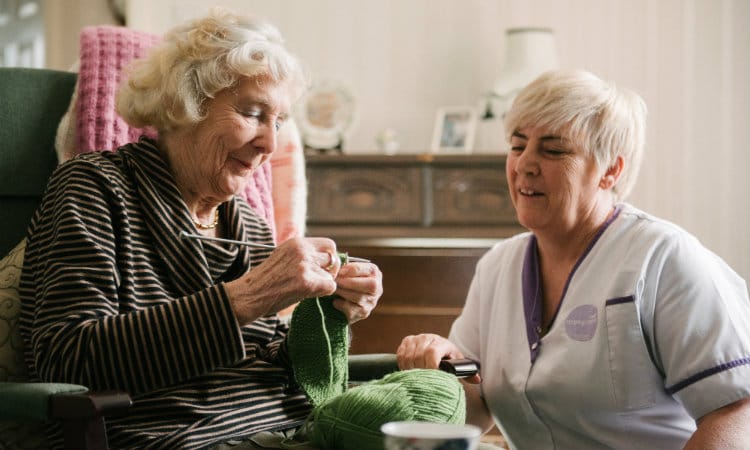As the seasons start to change, the weather inevitably changes too. Long passed are the hazy days of summer, with its warm evenings and endless sun. As the leaves begin to change, so does the temperature and weather, and with it brings the rainy days of autumn. If you’re receiving live-in care and like to keep busy, there’s plenty of ways that you can continue to do this that doesn’t involve being outside in the cold and wet (although sometimes going for a walk in the rain, wrapped up against the elements under the shelter of an umbrella, can be a wonderful experience!).
For those that are living with a progressive illness or who are in their elderly years, it’s really important to have elements of stimulation in your everyday routine, particularly if your mobility is limited or you live with a mental health condition. Research shows that those who have long-term physical conditions are more likely to have mental health difficulties too, but a great way to combat this is to ensure your mind and body stay as active as they possibly can be.

The great thing about having a live-in carer is that you always have someone there who knows your routine and preferences and who can support you to do the activities you really enjoy. They’ll get to know you and your care needs, but also become more like a friend or extended member of the family, who is able to support you with both the practicalities and your emotional wellbeing.
So, if you are struggling for ideas for what you can do when it’s raining cats and dogs outside, read on to find out how you can while away the afternoons inside and still retain a positive mindset.
Exercise and physical activity
It goes without saying that doing some form of physical activity every day makes you feel better and more energised. There are countless studies and research pieces that state the benefits of regular exercise, such as a reduced risk of cancer, heart disease, dementia and even depression. But what about if you have reduced mobility and are unable to get around your house without some form of mobility aid or support from your carer?
Sitting exercises have become quite popular recently and are a great way to prevent your joints from stiffening up, improve flexibility and maintain strength. Simple movements such as stretching and moving your foot in a circular motion can be great for reducing the risk of blood clots and can be done either sitting in a sturdy chair or even in bed.
To make the activity more fun, why not try the movements to upbeat music or whilst you’re watching a favourite TV programme or film? You could even set yourself a target each week and attempt to improve each week over the winter, so that you have something to aim for.
Arts and crafts
Getting creative at home is one of the easiest ways to keep your mind active, and the possibilities really are endless. Studies have shown that doing arts and crafts is extremely beneficial for mental and physical health, particularly for the elderly.
Activities could include:
- Knitting – As well as having physical and mental health benefits, knitting for others can give you a sense of purpose. Perhaps you could make some knitted teddy’s or baby clothes for your local hospital. Or scarves and hats for a nearby homeless shelter during the colder months.
- Seasonal crafts – Creativity is one thing that doesn’t change as you get older, and there is always something you can make for a particular time of year. Why not try making paper Halloween decorations to get into the spooky season mood or handmade Christmas cards for your loved ones. You could even make some colourful window crafts using tissue paper and some glue fashioned into decorative shapes such as stars, butterflies or flowers.
- Puzzles and games – These are great for exercising your brain and help with reaction time, logic and spatial awareness. Jigsaws are very easy to get hold of and are good for dexterity, particularly a set with a thousand pieces! Card games are always a winner, and there are plenty to choose from to play with your carer or alone.
- Online versions – Technology has now reached a stage where you can do all of the things listed above, but online. There are lots of different games and apps available on tablets and desktop computers – such as puzzles, brain training and colouring in – that can keep you busy for the entire morning. Just remember to take a break from the screen at least every hour!

Books and music
Whether you love the sensory experience of reading a book and feeling the pages between your fingers and the smell of worn pages, or if you prefer to read from a tablet – there is a book for everyone. Similarly, the many different genres of music allow for everyone to have their favourite band or song that is guaranteed to get your toes tapping every time you hear it.
The great thing about music and books is that they have the ability to transport you to another place that is totally unique to you and your imagination. From faraway lands in another world to the headline act at a rock festival – you get to choose your adventure.
Not only does listening to music help you to keep mentally stimulated on a rainy day, but it can also help to improve your mental wellbeing and has even been found to reduce the feeling of pain.
If you have a favourite singer or band, why not make a playlist of their songs? Or you could even watch music videos, interviews or documentaries on YouTube. And if you struggle to read a novel, autobiography or fact file, you could ask your carer to read aloud for you or even invest in the audio version of the book.
Whatever you decide to do with your live-in carer, make sure that you take regular breaks and do something that you enjoy and look forward to. To find out more about live-in care, click here.
